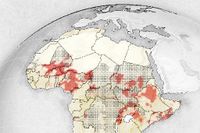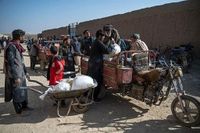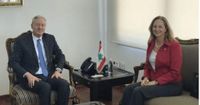The humanitarian crisis in Afghanistan is deepening as the World Food Programme (WFP) announced it will only be able to assist half of the 15 million Afghans currently suffering from hunger due to a significant reduction in aid from the United States. This alarming news comes as the WFP's representative in Kabul, Mutinta Chimuka, warned that the organization will only be able to provide support to approximately eight million people this year, a drastic cut from previous efforts. "With our current resources, barely eight million people will receive assistance this year," Chimuka stated, highlighting the dire situation where 3.1 million Afghans are already at the brink of famine, as defined by the United Nations.
The situation escalated after Washington announced in January a freeze on foreign aid and the dismantling of the agency managing it, USAID, which had been accused by former President Donald Trump of mismanagement without evidence. Despite assurances that emergency food assistance would be maintained, the recent decision to reduce aid to 14 countries, including Afghanistan, has put millions at risk. The WFP described the potential outcome of these cuts as a "death sentence" for millions of vulnerable individuals.
Chimuka expressed grave concerns, stating, "If this measure is implemented, it is a death sentence for millions of people." The WFP had initially planned to support nearly two million Afghans in the coming months, a number that was already a significant concern given the ongoing humanitarian crisis.
Since the Taliban took control in the summer of 2021, following the collapse of the US-backed Afghan government, international recognition of the Taliban regime has remained elusive, leaving the country reliant on minimal humanitarian aid. In Afghanistan, where decades of conflict have led to severe economic and humanitarian crises, 10% of children under five are suffering from food shortages, and 45% experience stunted growth, according to alarming statistics.
The WFP has already faced a 40% reduction in global funding this year, forcing them to halve the standard ration of 2,100 kilocalories recommended per person per day. Chimuka raised a critical question, asking, "If additional funds are not unlocked, how will people survive?" This uncertainty looms over the future of Afghanistan, where the UN Assistance Mission in Afghanistan (Manua) has urged international donors to support the 22.9 million Afghans in need of assistance this year.
In a related development, the Lebanese government is grappling with the aftermath of a devastating conflict that left the country in ruins. According to a World Bank estimate released on March 28, 2025, it will take $11 billion to rebuild the destroyed infrastructure in Lebanon. However, this international aid is contingent upon the disarmament of Hezbollah, a condition confirmed by Lebanese Foreign Minister Youssef Rajji in an interview on April 11, 2025.
The conflict, which escalated in September 2024 and ended with a fragile ceasefire on November 27, claimed over 4,000 lives and injured 16,000 individuals, displacing approximately 1.2 million Lebanese and damaging or destroying 100,000 homes. The Lebanese government, led by Prime Minister Nawaf Salam and President Joseph Aoun since January 2025, faces a severe lack of resources for reconstruction. Finance Minister Yassine Jaber stated on April 10, 2025, that the state could cover "practically none" of the costs.
While Hezbollah has already invested $650 million in housing and restoration efforts, this funding, partially sourced from Iran, falls short of meeting the extensive needs of the population. The disarmament of Hezbollah remains a critical demand from international donors, including the United States, which has made clear that financial assistance will not come without significant reforms and a monopoly on arms within the state.
During her visits to Beirut, US envoy Morgan Ortagus emphasized the urgency of these reforms, stating, "Much remains to be done." The US has linked its support, including $117 million in military aid announced on January 16, 2025, to the rigorous application of UN Resolution 1701, which mandates the disarmament of all militias in Lebanon, including Hezbollah.
In February 2025, the Lebanese army seized over 250 caches of Hezbollah arms and integrated 4,000 recruits to secure the southern regions. However, these actions are deemed insufficient by Washington, which is calling for total disarmament.
In addition to disarmament, structural economic reforms are also a pressing demand from donors. Lebanon has been in crisis since 2019, with its currency devalued by 95% and its banking system in disarray. The International Monetary Fund (IMF) and the World Bank have linked their financial support to necessary banking restructuring and anti-corruption measures.
The European Union, which promised 500 million euros in 2024 to curb migration flows, has delayed its payments pending these reforms. The Lebanese government is committed to reform, as evidenced by a preliminary plan presented on April 10, 2025, to modernize its operations by transitioning from paper to digital systems.
However, the slow pace of progress in a country long plagued by political paralysis is breeding skepticism among donors. The fragile ceasefire negotiated by the US rests on tenuous commitments, with Israel maintaining a military presence in strategic locations in southern Lebanon to monitor Hezbollah.
Lebanese officials have called for international pressure to secure the withdrawal of Israeli forces, arguing that this would undermine Hezbollah's justification for its armament. In a statement on April 11, Rajji insisted, "Diplomacy must prevail to liberate our lands," yet Israel continues targeted strikes, citing violations of the ceasefire by Hezbollah.
The US is proposing to establish three working groups to address disputes between Lebanon and Israel, including prisoner releases and border demarcation. However, Lebanon is resistant to this approach, preferring a military commission for border delineation, as was done in the 2022 maritime agreement. Rajji has stated that "prisoners and withdrawal are non-negotiable," reflecting a consensus across political factions in Lebanon.
Despite Hezbollah's weakened military position following the death of its leader Hassan Nasrallah in September 2024, the group remains influential, with its political arm holding seats in Parliament. Some members have expressed a willingness to discuss a national defense strategy, contingent upon Israel's withdrawal.
International donors, led by the US and Saudi Arabia, are closely monitoring Lebanon's progress. Washington sees Joseph Aoun, the Lebanese military leader, as a reliable ally, having previously bolstered military capabilities against ISIS in 2017. Saudi Arabia, after years of disengagement, is conditioning its aid on anti-corruption reforms and a reduction of Iranian influence.
As the Lebanese government faces mounting internal pressures, protests have erupted over the slow compensation for businesses destroyed in the conflict. Hezbollah has distributed $50 million in cash and promised $8,000 per family for destroyed housing, but these funds are limited and fall short of expectations.
In conclusion, both Afghanistan and Lebanon are at critical junctures, facing immense challenges exacerbated by political instability and international funding cuts. Without substantial support and effective governance, the humanitarian crises in these nations are likely to deepen, leading to dire consequences for their populations.



